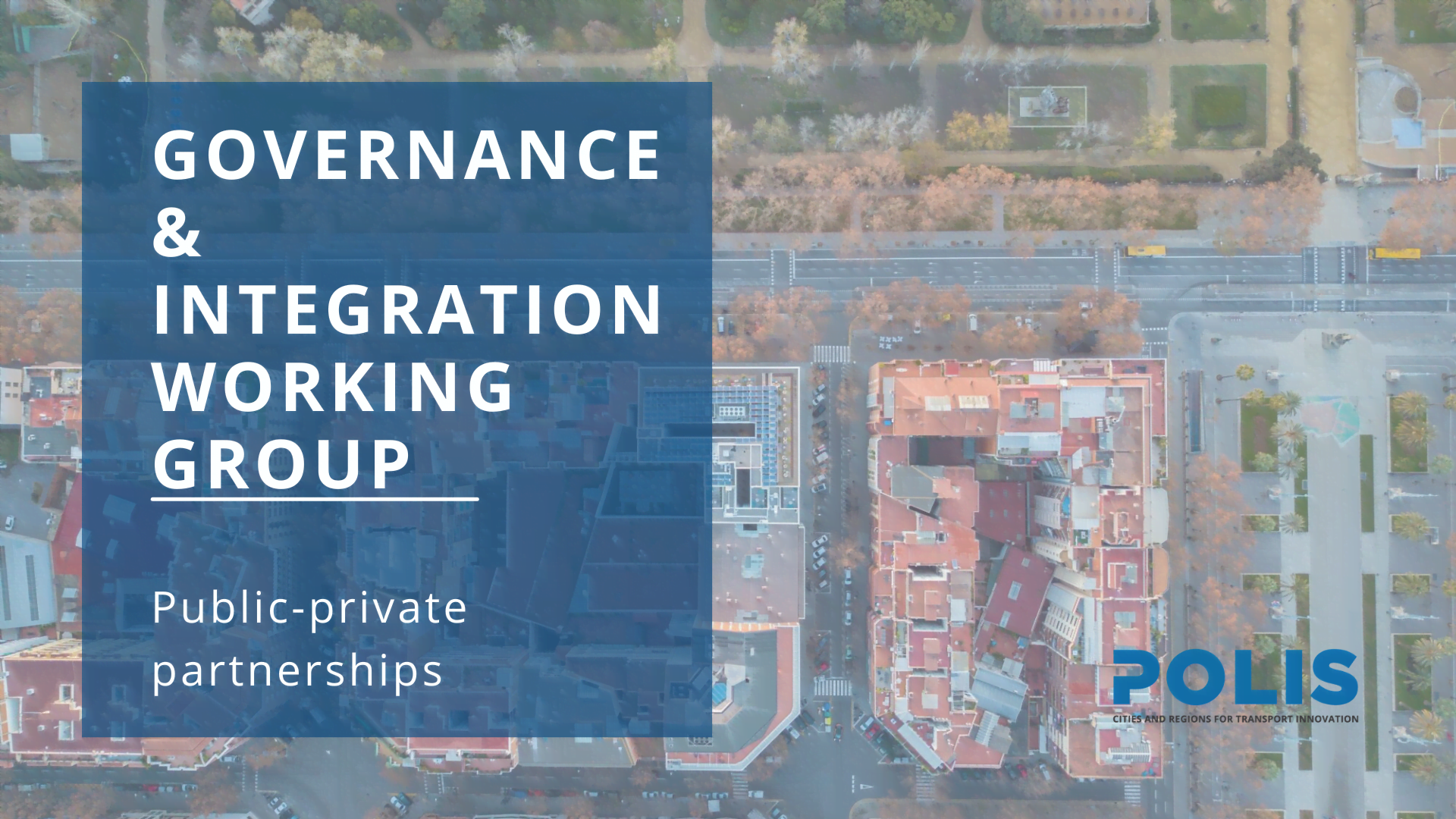Governance and Integration Working Group meeting: Public Private Partnerships
Achieving sustainability goals means working together. Both local authorities and private operators are pioneering exciting new mobility services, so how can we pool our resources?
On 6 and 7 May, 2021 POLIS’ Working Group Governance & Integration will meet to discuss the role of public-private partnerships for the next generation of urban transport. Join to find out more on filling gaps, sharing data and shaping change!
If the shift to sustainable mobility is to be accelerated, users need a wider “menu” with affordable, versatile, safe, and reliable alternatives. Mass Public Transport provides the backbone, but cannot respond to all needs, nor provide all options. The energy and the innovation capacity of new mobility services can be a precious resource – but, for that to happen, we need a shared vision, appropriate regulatory frameworks, fair public private partnerships, and practical solutions.
Across 4 sessions the group will discuss frameworks, data sharing and partnerships. Particular attention will be paid to micromobiltiy and lessons learned (so far!).
Session 1: Shaping Partnerships at Local & Regional Scale (6 May; 11h00-12h30)
Regional, local and transport authorities are establishing frameworks to work with several private operators. This is a very important step for responding to urban mobility needs with versatile solutions for diverse territories, but also for shaping long-term partnerships… and promoting innovation!
Approaches vary – between having MaaS as the guiding star, building individual agreements one after another, establishing regulation, and more. And some are starting now! In this session we’ll discuss examples and key takeaways.
Session 2: Sharing Data from Shared Micromobility (6 May; 15h30-17h00)
Collecting, sharing, and analysing mobility data is an expanding need. Information on mobility patterns, including traffic flows, parking, and use of shared vehicles, is instrumental for designing effective policy agendas and enforcement instruments.
However, without uniformity in data processing and storage, effective data sharing between cities and other mobility stakeholders may prove challenging. POLIS members Amsterdam, Utrecht, Eindhoven, Rotterdam, together with The Hague developed an initial version of a City Data Standard-Mobility (CDS-M), and will be testing it with cars and cross-city permits, e-hubs and e-scooters, shared cargo bikes, and shared scooters.
In this session we will learn more about this, compare CDS-M to other mobility data formats and specifications, and discuss the way forward towards European convergence and interoperability
Session 3: Partnering to fill the gaps of mass transit (7 May; 11h00-12h30)
Mass public transport is an urban Right – but serving low demand with large empty vehicles is an urban wrong. Low-density areas and off-peak hours may require tailored solutions, that provide reliable, safe, and affordable options to passengers, and enable public authorities to fulfil their mission in a sustainable way, both financially and environmentally. A growing number of new solutions have been emerging from the private sector – new mobility services, but also new tools that can make public private partnerships work. In this session we will be exploring projects and practical solutions.
Session 4: Shared Micromobility: taking stock of the rolling stock (7 May; 14h00-15h30)
Almost four years have passed since shared e-scooters started running in our streets, taking shared micromobility way beyond bikes, and opening up new opportunities – and new challenges – for public authorities. Thousands of vehicles were deployed in countless cities, and dozens of new companies came into the urban mobility market. On top of this, one year of pandemics and lockdowns brought an unexpected stress test into an emerging market.
How are things evolving? Is shared micromobility gaining new users, or striving to survive? Is it living up to its promise of supporting the shift to sustainable mobility? Have we found effective solutions for parking and safe circulation? Are public authorities happy with their regulatory frameworks? What have we learned that works, and doesn’t work?
How are we doing? In this session cities and private operators will be invited to discuss lessons learned, and look at the future. And we’ll learn about the brand-new European Shared Mobility Index.
For any questions regarding the group please contact Pedro Homem de Gouveia.
POLIS working groups are open to our members. If you are interested in finding out more about our membership options, please contact Pasquale Cancellara.
